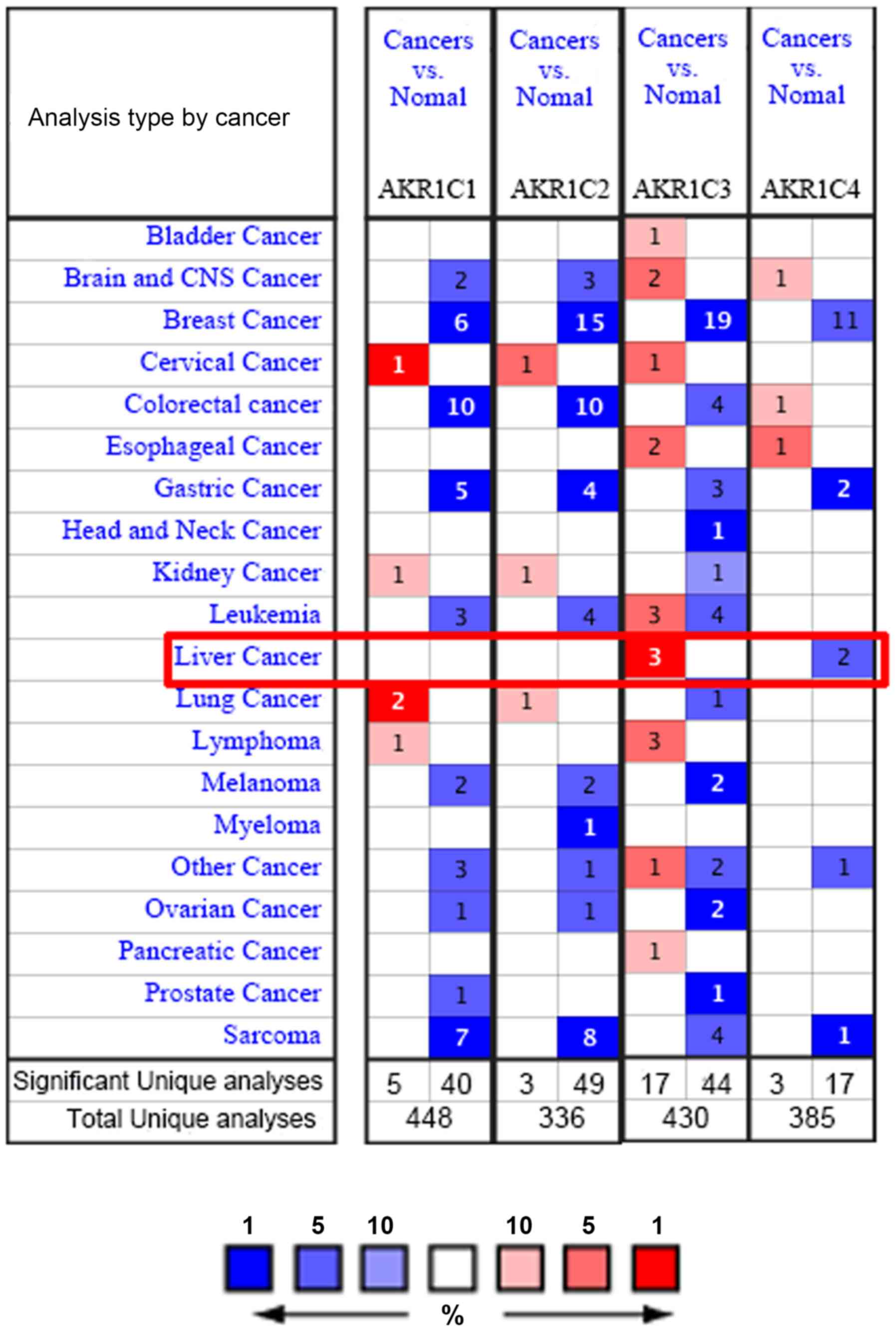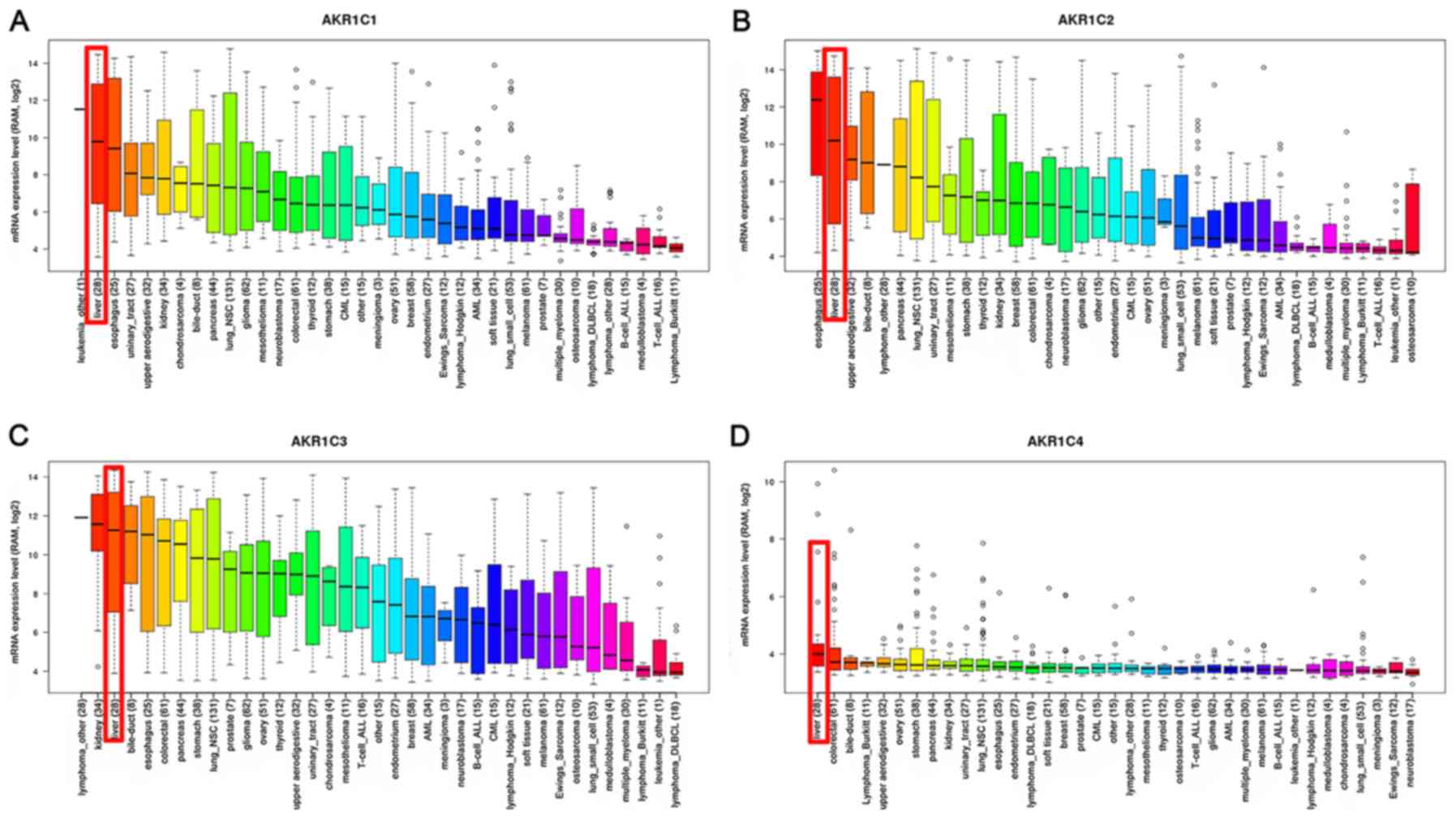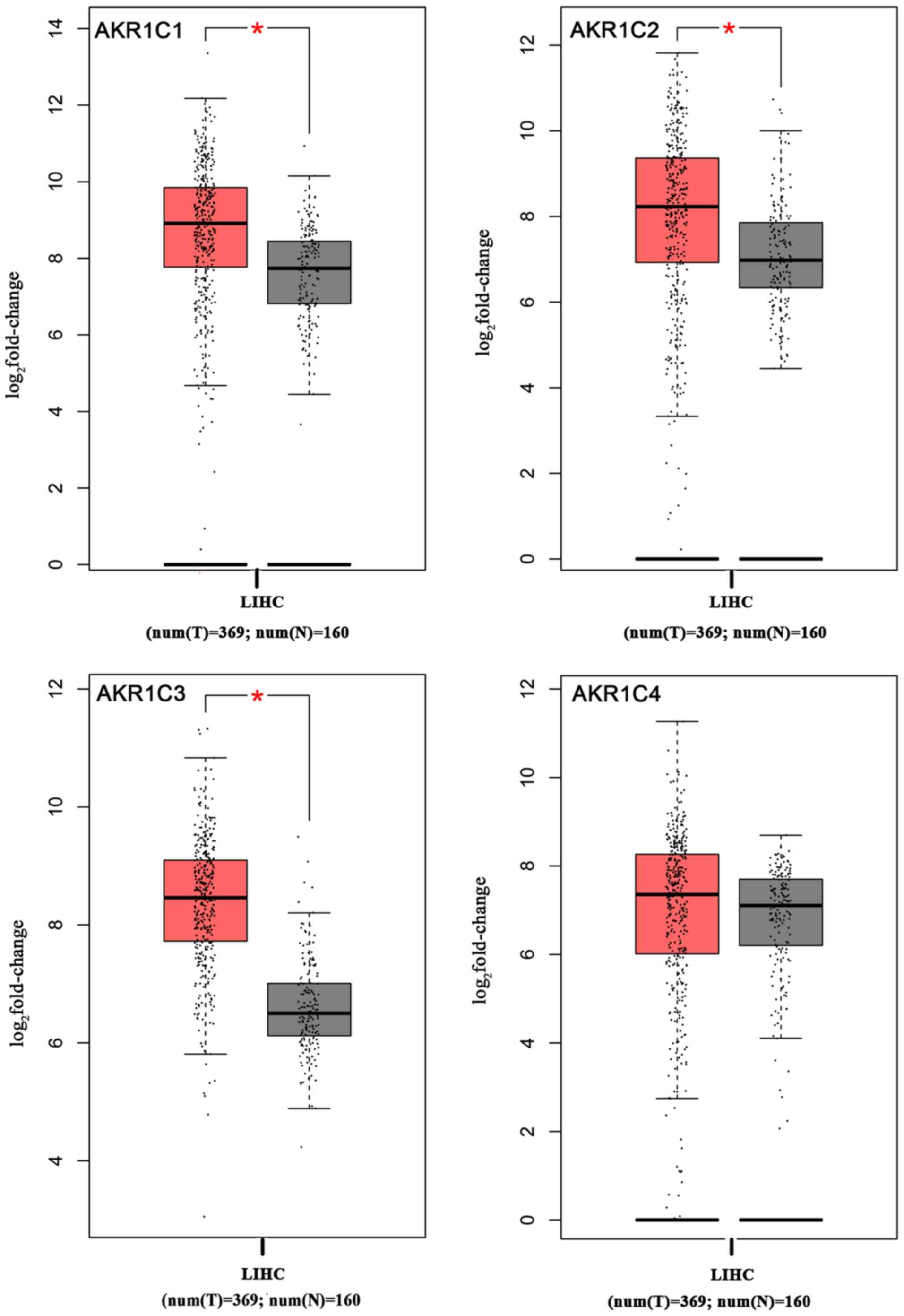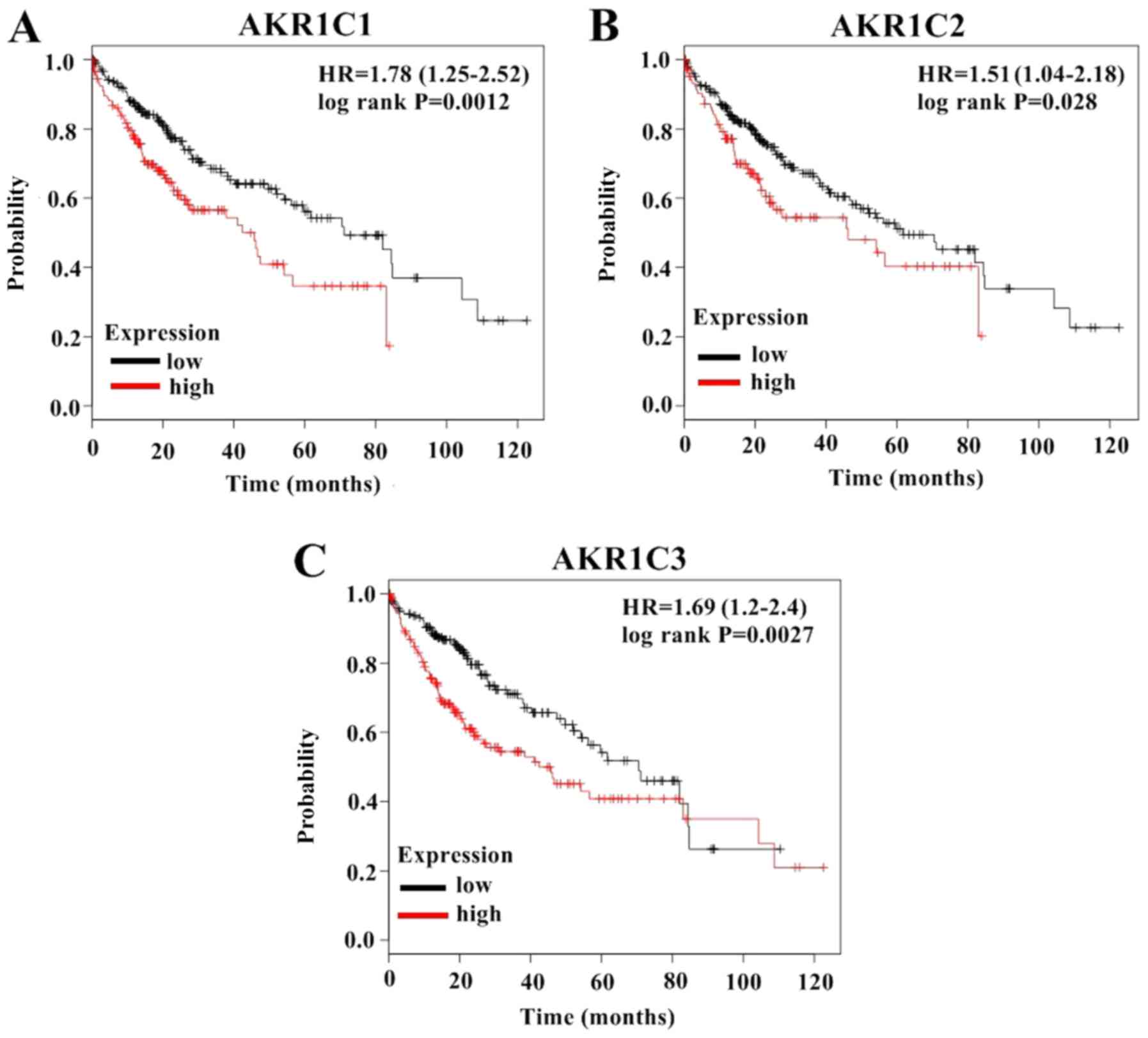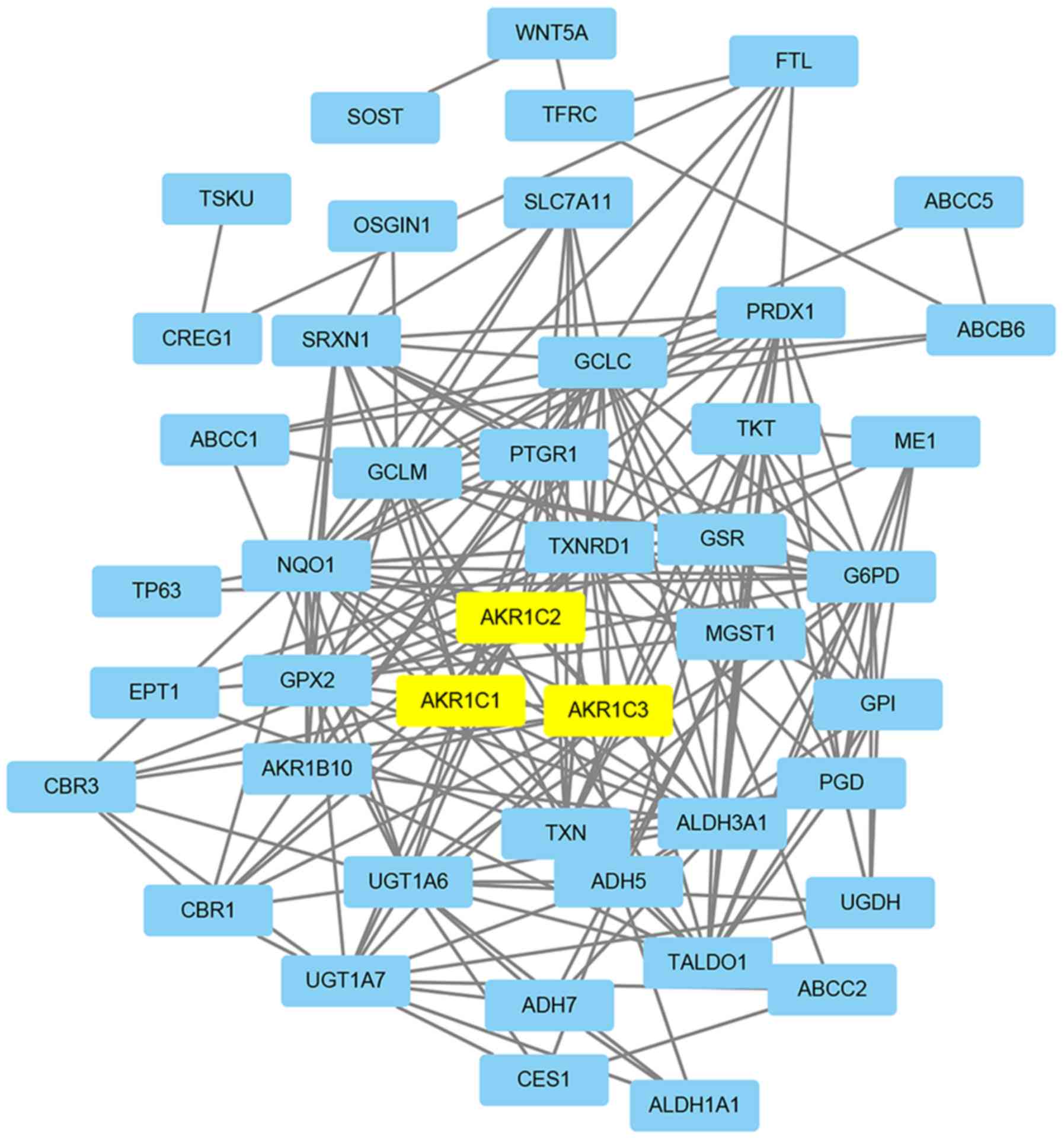|
1
|
Siegel RL, Miller KD and Jemal A: Cancer
statistics, 2018. CA Cancer J Clin. 68:7–30. 2018. View Article : Google Scholar : PubMed/NCBI
|
|
2
|
Heimbach JK, Kulik LM, Finn RS, Sirlin CB,
Abecassis MM, Roberts LR, Zhu AX, Murad MH and Marrero JA: Aasld
guidelines for the treatment of hepatocellular carcinoma.
Hepatology. 67:358–380. 2018. View Article : Google Scholar : PubMed/NCBI
|
|
3
|
Liu S, Miao R, Zhai M, Pang Q, Deng Y, Liu
S, Qu K, Liu C and Zhang J: Effects and related mechanisms of
serotonin on malignant biological behavior of hepatocellular
carcinoma via regulation of Yap. Oncotarget. 8:47412–47424.
2017.PubMed/NCBI
|
|
4
|
Black AP and Mehta AS: The search for
biomarkers of hepatocellular carcinoma and the impact on patient
outcome. Curr Opin Pharmacol. 41:74–78. 2018. View Article : Google Scholar : PubMed/NCBI
|
|
5
|
Behne T and Copur MS: Biomarkers for
hepatocellular carcinoma. Int J Hepatol. 2012:8590762012.
View Article : Google Scholar : PubMed/NCBI
|
|
6
|
Zhao YJ, Ju Q and Li GC: Tumor markers for
hepatocellular carcinoma. Mol Clin Oncol. 1:593–598. 2013.
View Article : Google Scholar : PubMed/NCBI
|
|
7
|
Barski OA, Mindnich R and Penning TM:
Alternative splicing in the Aldo-Keto reductase superfamily:
Implications for protein nomenclature. Chem Biol Interact.
202:153–158. 2013. View Article : Google Scholar : PubMed/NCBI
|
|
8
|
Rizner TL and Penning TM: Role of
Aldo-Keto reductase family 1 (AKR1) enzymes in human steroid
metabolism. Steroids. 79:49–63. 2014. View Article : Google Scholar : PubMed/NCBI
|
|
9
|
Frycz BA, Murawa D, Borejsza-Wysocki M,
Wichtowski M, Spychała A, Marciniak R, Murawa P, Drews M and
Jagodziński PP: Transcript level of AKR1C3 is down-regulated in
gastric cancer. Biochem Cell Biol. 94:138–146. 2016. View Article : Google Scholar : PubMed/NCBI
|
|
10
|
Sun SQ, Gu X, Gao XS, Li Y, Yu H, Xiong W,
Yu H, Wang W, Li Y, Teng Y and Zhou D: Overexpression of AKR1C3
significantly enhances human prostate cancer cells resistance to
radiation. Oncotarget. 7:48050–48058. 2016.PubMed/NCBI
|
|
11
|
Lewis MJ, Wiebe JP and Heathcote JG:
Expression of progesterone metabolizing enzyme genes (AKR1C1,
AKR1C2, AKR1C3, SRD5A1, SRD5A2) is altered in human breast
carcinoma. BMC Cancer. 4:272004. View Article : Google Scholar : PubMed/NCBI
|
|
12
|
Wenners A, Hartmann F, Jochens A, Roemer
AM, Alkatout I, Klapper W, van Mackelenbergh M, Mundhenke C, Jonat
W and Bauer M: Stromal markers AKR1C1 and AKR1C2 are prognostic
factors in primary human breast cancer. Int J Clin Oncol.
21:548–556. 2016. View Article : Google Scholar : PubMed/NCBI
|
|
13
|
Rhodes DR, Yu J, Shanker K, Deshpande N,
Varambally R, Ghosh D, Barrette T, Pandey A and Chinnaiyan AM:
ONCOMINE: A cancer microarray database and integrated Data-Mining
platform. Neoplasia. 6:1–6. 2004. View Article : Google Scholar : PubMed/NCBI
|
|
14
|
Barretina J, Caponigro G, Stransky N,
Venkatesan K, Margolin AA, Kim S, Wilson CJ, Lehár J, Kryukov GV,
Sonkin D, et al: The cancer cell line encyclopedia enables
predictive modelling of anticancer drug sensitivity. Nature.
483:603–607. 2012. View Article : Google Scholar : PubMed/NCBI
|
|
15
|
Győrffy B, Surowiak P, Budczies J and
Lánczky A: Online survival analysis software to assess the
prognostic value of biomarkers using transcriptomic data in
Non-small-cell lung cancer. PLoS One. 8:e822412013. View Article : Google Scholar : PubMed/NCBI
|
|
16
|
Győrffy B, Lánczky A and Szállási Z:
Implementing an online tool for genome-wide validation of
survival-associated biomarkers in ovarian-cancer using microarray
data from 1287 patients. Endocr Relat Cancer. 19:197–208. 2012.
View Article : Google Scholar : PubMed/NCBI
|
|
17
|
Menyhart O, Nagy A and Gyorffy B:
Determining consistent prognostic biomarkers of overall survival
and vascular invasion in hepatocellular carcinoma. R Soc Open Sci.
5:1810062018. View Article : Google Scholar : PubMed/NCBI
|
|
18
|
Szász AM, Lánczky A, Nagy Á, Förster S,
Hark K, Green JE, Boussioutas A, Busuttil R, Szabó A and Győrffy B:
Cross-validation of survival associated biomarkers in gastric
cancer using transcriptomic data of 1,065 patients. Oncotarget.
7:49322–49333. 2016. View Article : Google Scholar : PubMed/NCBI
|
|
19
|
Györffy B, Lanczky A, Eklund AC, Denkert
C, Budczies J, Li Q and Szallasi Z: An online survival analysis
tool to rapidly assess the effect of 22,277 genes on breast cancer
prognosis using microarray data of 1,809 patients. Breast Cancer
Res Treat. 123:725–731. 2010. View Article : Google Scholar : PubMed/NCBI
|
|
20
|
Szklarczyk D, Franceschini A, Wyder S,
Forslund K, Heller D, Huerta-Cepas J, Simonovic M, Roth A, Santos
A, Tsafou KP, et al: STRING v10: Protein-protein interaction
networks, integrated over the tree of life. Nucleic Acids Res.
43((Database Issue)): D447–D452. 2015. View Article : Google Scholar : PubMed/NCBI
|
|
21
|
Chen X, Cheung ST, So S, Fan ST, Barry C,
Higgins J, Lai KM, Ji J, Dudoit S, Ng IO, et al: Gene expression
patterns in human liver cancers. Mol Biol Cell. 13:1929–1939. 2002.
View Article : Google Scholar : PubMed/NCBI
|
|
22
|
Wurmbach E, Chen YB, Khitrov G, Zhang W,
Roayaie S, Schwartz M, Fiel I, Thung S, Mazzaferro V, Bruix J, et
al: Genome-wide molecular profiles of HCV-induced dysplasia and
hepatocellular carcinoma. Hepatology. 45:938–947. 2007. View Article : Google Scholar : PubMed/NCBI
|
|
23
|
Roessler S, Jia HL, Budhu A, Forgues M, Ye
QH, Lee JS, Thorgeirsson SS, Sun Z, Tang ZY, Qin LX and Wang XW: A
unique metastasis gene signature enables prediction of tumor
relapse in early-stage hepatocellular carcinoma patients. Cancer
Res. 70:10202–10212. 2010. View Article : Google Scholar : PubMed/NCBI
|
|
24
|
Tang Z, Li C, Kang B, Gao G, Li C and
Zhang Z: GEPIA: A web server for cancer and normal gene expression
profiling and interactive analyses. Nucleic Acids Res. 45:W98–W102.
2017. View Article : Google Scholar : PubMed/NCBI
|
|
25
|
Hevir N, Vouk K, Sinkovec J, Ribic-Pucelj
M and Rizner TL: Aldo-Keto reductases AKR1C1, AKR1C2 and AKR1C3 may
enhance progesterone metabolism in ovarian endometriosis. Chem Biol
Interact. 191:217–226. 2011. View Article : Google Scholar : PubMed/NCBI
|
|
26
|
Tian H, Li X, Jiang W, Lv C, Sun W, Huang
C and Chen R: High expression of AKR1C1 is associated with
proliferation and migration of small-cell lung cancer cells. Lung
Cancer (Auckl). 7:53–61. 2016.PubMed/NCBI
|
|
27
|
Tiryakioglu NO and Tunali NE: Association
of AKR1C3 Polymorphisms with bladder cancer. Urol J. 13:2615–2621.
2016.PubMed/NCBI
|
|
28
|
Lu D, Zhang X and Cao X: The effect of
AKR1C2 gene on hepatocarcinogenesis and its abnormal expression in
hepatocellular carcinoma from Qidong, China, a liver cancer high
risk area. Progress Biochemistry Biophysics. 30:906–918. 2003.
|
|
29
|
Zhong T, Xu F, Xu J, Liu L and Chen Y:
Aldo-Keto reductase 1C3 (AKR1C3) is associated with the doxorubicin
resistance in human breast cancer via PTEN loss. Biomed
Pharmacother. 69:317–325. 2015. View Article : Google Scholar : PubMed/NCBI
|
|
30
|
Xiong W, Zhao J, Yu H, Li X, Sun S, Li Y,
Xia Q, Zhang C, He Q, Gao X, et al: Elevated expression of AKR1C3
increases resistance of cancer cells to ionizing radiation via
modulation of oxidative stress. PLoS One. 9:e1119112014. View Article : Google Scholar : PubMed/NCBI
|
|
31
|
Zeng CM, Chang LL, Ying MD, Cao J, He QJ,
Zhu H and Yang B: Aldo-Keto Reductase AKR1C1-AKR1C4: Functions,
regulation, and intervention for Anti-cancer therapy. Front
Pharmacol. 8:1192017. View Article : Google Scholar : PubMed/NCBI
|
|
32
|
Dhanasekaran R, Limaye A and Cabrera R:
Hepatocellular carcinoma: Current trends in worldwide epidemiology,
risk factors, diagnosis, and therapeutics. Hepat Med. 4:19–37.
2012.PubMed/NCBI
|
|
33
|
Abbattista MR, Jamieson SM, Gu Y, Nickel
JE, Pullen SM, Patterson AV, Wilson WR and Guise CP: Pre-clinical
activity of PR-104 as monotherapy and in combination with sorafenib
in hepatocellular carcinoma. Cancer Biol Ther. 16:610–622. 2015.
View Article : Google Scholar : PubMed/NCBI
|















